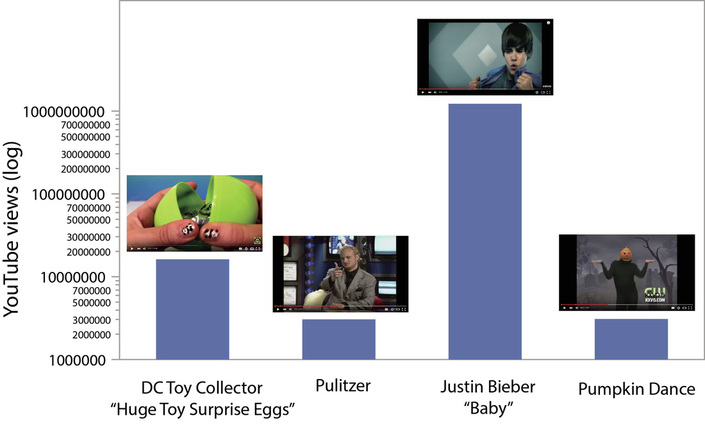
Well, okay, that's not a 100% accurate statement: I'm not sure what the actual title of the award is, and Pulitzer didn't formally announce that he'd won. I'm also not sure if there's a statue or a plaque or something that goes with the title. Perhaps I can create some kind of certificate to mark this special distinction.
I think this comparative plea for recognition (titled "Do Explorers on TV Impact Our Social Lives?"), like many things associated with Pulitzer, is pretty funny. But I also think it reveals something interesting about the struggle for credibility, influence, and identity in the crowded arena of "forbidden history." From the first time I saw Pulitzer on The Curse of Oak Island, my hypothesis about him has been that he's all about getting himself on TV. Nothing I have seen since then has changed my opinion, and this comparison with TV "explorers" reinforces it: this is a person who very much wants to be in the TV club. But he also wants you to think he can be influential without being on TV. He's working on making his case for being on television even while pretending he doesn't want or need to be on television. It's a little bizarre.
It's fair to ask why television appearances retain such prestige in the internet age. There are, after all, now a lot of ways to spread a message that don't require an investment from a production company or a television network: blog posts, YouTube videos, podcasts, Twitter, Facebook groups, etc. My gut feeling is that the combined impact of all of these "ground up" mechanisms and avenues for spreading ideas is probably significantly greater than television programming, especially among people in their twenties and thirties. There is some evidence suggesting that the popularity of "fringe" television programming ( a growth industry over the last few years) may be starting to decline. Perhaps television appearances retain a special allure as a signal of success not because they are the best way to communicate an idea, but because the outside investment in that communication appears to represent an independent nod of approval.
Divorced from its "I should be in the TV club" subtext, Pulitzer's point is a fair one: influence really can't be measured simply by success on television. I don't think anyone would argue that. But I also think it's silly to claim that "social power" can be measured by YouTube views (or Twitter followers, or Facebook group membership counts). Taking YouTube views as the metric, for example, Pulitzer's influence lags far behind such icons of "social power" as Justin Bieber and many anonymous people who systematically reveal things hidden inside toy eggs. By his count, Pulizer's "social power" is neck-and-neck with this guy who recorded himself in a pumpkin mask and leotard dancing to the theme from Ghostbusters nine years ago.
I'm also not sure what videos Pulitzer includes in his own total. Does he count the 1,439 views of the "Who Is J. Hutton Pulitzer?" video where he states that his "instinct to excel" is "part of his genetic legacy"? Does he include the whopping 249 views of this video about the "Copper Culture" that includes allegedly fake artifacts?
Lack of clarity about actual data (and what they mean) is not a surprise from Pulitzer: it's typical and, I think, symptomatic of the real reason he doesn't have his own television program. Unlike Wolter, Pulitzer has neither an idea of his own nor the understanding of how to make a compelling argument about one. And, in my opinion, he hasn't demonstrated the charisma, personality, or minimal expertise necessary to successfully or credibly host a travel-based program like Gates' Expedition Unknown. But I'm not a TV producer, so what the hell do I know? I'm just a simple archaeologist who has never been on television (other than a few minutes of local news here and there) and had no part in inventing a product that contributed to the demise of RadioShack.
I've been criticized in the past for going after Pulitzer's style rather than the substance of his ideas. My defense to that is simple: what ideas? Show me an actual argument based on evidence and I'd be happy to have a look at it. I have yet to see anything interesting backing up the fluff and bluster, and I think it's pretty easy to see through all the silliness (it's much easier to simply re-label photographs and do interviews than it is to actually collect data and perform an analysis). What's left when you strip away the show business? Not much. For me, Pulitzer's case has become an interesting one to watch to see how far the guy can get by re-inventing himself as an "explorer," growing a beard, and asserting that he is exposing "forbidden truths." How do you measure success in that endeavor? Pulitzer seems to be making the argument that you can measure success by "social power" (as well as, presumably, television ratings, paid speaking appearances, book sales, etc.). There's undoubtedly something to that. But if YouTube views are supposed to be some kind of indication of substance, I present to you the Justin Bieber and Pumpkin Dance evidence as Exhibit A of my counter-argument. And I still can't find Pulitzer's newly-minted term "OOP-gly" on Wikipedia. So it seems full mastery of the online environment remains an unattained goal, with plenty of room for growth.



 RSS Feed
RSS Feed
